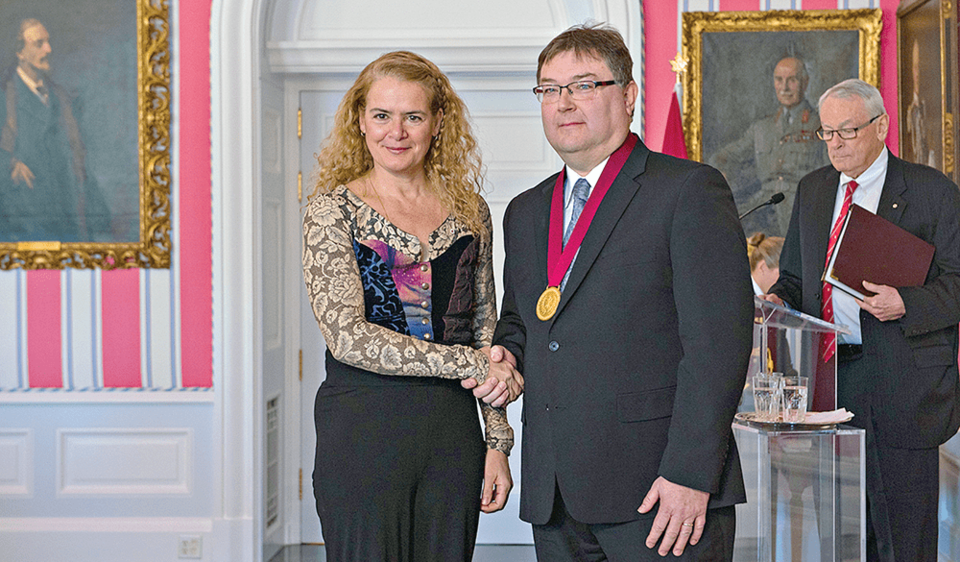BY JOHN CHICK Special to the VOICE
History classes don’t always have to limit themselves to what happened in the past.
That was Paul Paterson’s logic two years ago during Canada’s 150th anniversary celebrations, when he devised a unique class project for his Grade 10 history students at Hamilton’s Westmount Secondary School. On Monday, January 28, the fruits of his idea were rewarded when he received the Governor General’s History Award for Excellence in Teaching from Julie Payette, in Ottawa.
“In 2017, during the celebration … I was really moved by the Vimy Ridge commemoration, and there was a lot of stuff I really, really liked, but I just had this feeling that something was missing,” Paterson said last week at his Ridgeville home.
“Then I got a copy of Canada’s History magazine, and there was an article in there by Lt. Gen. Romeo Dallaire called ‘Marching Orders.’ And it was a criticism, I guess. What are we doing beyond this? He talked about how he would ask his colleagues, ‘What are we doing?’ and everybody said ‘celebrating’ or ‘commemorating,’ whatever. And his point was, what is the next big challenge? What are we committing ourselves to?”
The ongoing concept borne out of it was what would Canada’s next 50 years look like, using the past as a sort of inventive prologue.
“Canada has always been a country that has done things,” Paterson said. “We built a railroad. Built a road across this country. And even the things we were commemorating, like World War One, we were really a country that didn’t have an army per se, yet we managed to put together a fighting force that made us quite proud during the Great War.”
“I got asking the question, in 50 years, on our 200th birthday, what are we going to be celebrating then? What’s going to be the big thing? Are we still going to be looking back at Vimy Ridge and the Charter of Rights and Freedoms, and Juno Beach, and all of those things — which are amazing events — but if that’s where it ended, did we peak in 1982?”
Paterson tasked his students to create a think tank that would find Canadian solutions to the challenges of tomorrow. Pupils are allowed to work either alone or in pairs, but are encouraged to maintain constant communication with the larger group to find connections between ideas.
Perhaps not surprisingly, the youth of today sought a heavy focus on environmental concerns and sustainability. Still, Paterson stresses that he urged — and received — realistic results.
“They developed these policies, and came up with fairly aggressive, in some cases, and very creative, in other cases — solutions that are actionable,” he said. “I told them early on that this isn’t pie-in-the-sky, this is not The Jetsons, and we’re all not going to have flying cars.”
Yet the ideas the students chose to tackle were also diverse. One focused on Arctic sovereignty amid climate change and escalating Russian aggression. Some covered First Nations conditions, and others on the future of film production in Canada. The projects they worked on also created built-in history lessons, such as one that aims to make Canada a world leader in health technology and innovative therapies and treatments.
“The neat part of that for me as a history teacher — I know a lot about World War Two, World War One, and all that kind of stuff — is I know absolutely nothing about medical technology,” Paterson said. “And they drove the bus on this, and had to go find the history of Canadian innovation. So they looked at things like the development of insulin [invented by Canadian Frederick Banting] and pablum [developed by a trio of Canadians in the 1930s], and all those sorts of things throughout the 20th century.”
The last step of the project, which is now wrapping up its fourth and fifth classes under Paterson, is for the students to identify people, politicians and organizations that they can send a final draft proposal to. Many of those recipients, such as former astronaut Marc Garneau, as well as the premier of Ontario, have seemingly welcomed the ideas.
“Doug Ford actually got back to one of my students on an issue around Golden Horseshoe transportation,” Paterson said. “And it was obviously not like a form letter, it was personalized.”
Paterson has been teaching for 13 years, but has been a Pelham resident since he was a teenager in the 1980s. He enjoys his daily commute to Hamilton Mountain, saying it actually gives him a necessary breather.
“It sort of clears my head, makes me feel better about my day, wakes me up, and makes me feel better about my day at the end of it,” he said.
He was nominated for the Governor General’s Award last year, and found out in September he had won the prize. Paterson was effusive in his praise for his school administrators for the opportunity to pursue what he calls a teaching philosophy that doesn’t ask students what they want to learn, but instead what problems they want to solve.
“If I don’t get the support for this from my administration at the Hamilton-Wentworth District School Board and department heads, principals and vice-principals, then this doesn’t happen,” he said.
“It is kind of outside-the-box. So I’ve always put it: they give me enough rope to hang myself with.”



